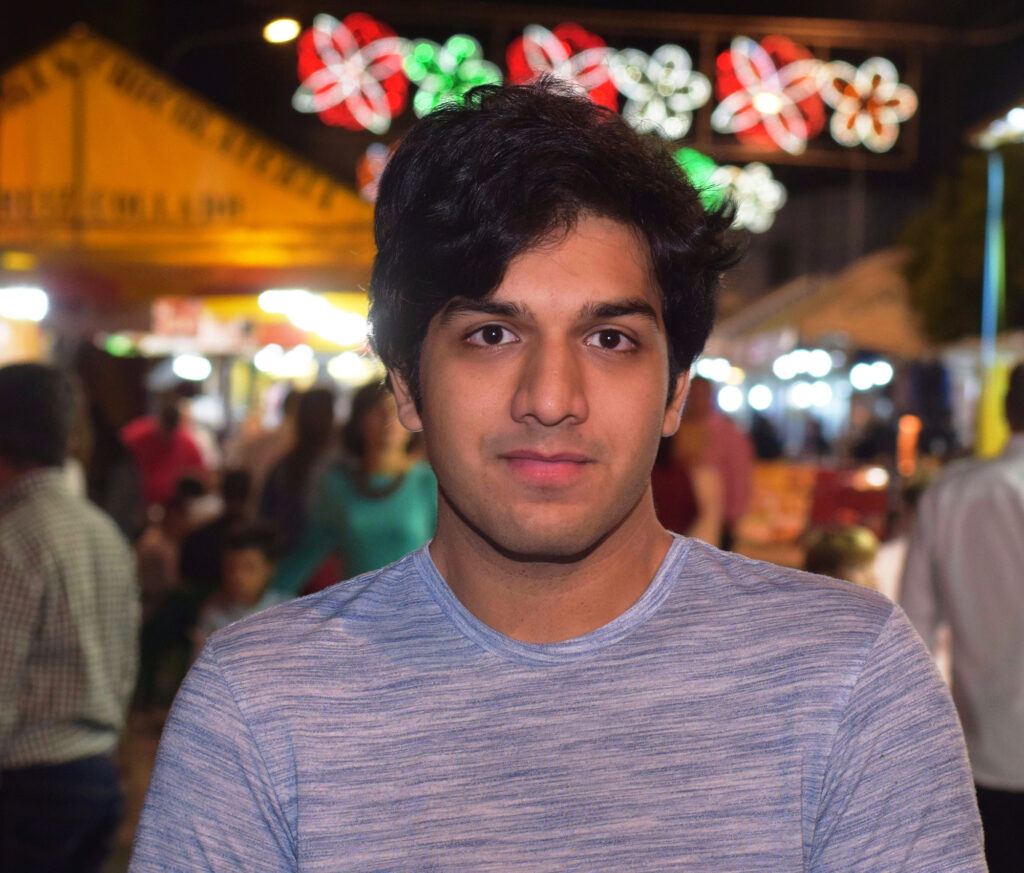Aqiil Gopee: Scholar, Writer, Future Teacher


In his home country of Mauritius, Aqiil Gopee ’20 is celebrated as something of a celebrity for his creative writing. But when he came to Amherst, Gopee initially evaded the humanities.
Instead, he hoped to fall in love with something new. Despite experimenting with different disciplines, Gopee found himself again entrenched in literary studies — this time within the realm of the Quran.
As I spoke with Gopee during the last week of school, he recounted his Amherst experience with sharp specificity, despite being visibly tired in the wake of his last finals push. Coming off the heels of his thesis defense (literally minutes before our Zoom call), he spoke of his work with passion and enthusiasm, indicating a real love of his chosen academic subject, the Quran. Notably humble, Gopee avoided speaking about his accolades, not wanting to give himself too much credit.
A Scholar of Literature
In high school, Gopee’s writing was recognized internationally. Yet, he waited until the end of the interview to volunteer such information about himself. In 2014, he was named the Laureate of the Prix International du Jeune Écrivain de Langue Française, an award widely recognized throughout the Francophone world.
The commission flew him to Paris as a representative for Mauritius, and when he returned home, things were a little bit different.
“When I went back, it was weird,” Gopee remembers. “Mauritius is such a small country, and I became sort of famous. Everyone was so excited because people don’t even know what Mauritius is or who Mauritians are.”
While his accolades were recognized globally, Gopee faced a lot of pressure from those around him. He was constantly asked about his next projects, and it seemed everyone started to expect the same level of success. At the same time, Gopee became insecure about his abilities, fearing that he was “only good at literature.”
His first book, “La Pièce,” was published in April 2012 after receiving a jury mention in the Prix du Livre d’Or. In 2013, he published two other books titled “Fantômes” and “Orgasmes.” In 2014, he was proclaimed laureate of the Prix du jeune écrivain de langue française in France for his short-story “Loup et Rouge,” a reconstruction of Little Red Riding Hood.
Starting college in the United States gave Gopee the blank slate that he desired. When he started at Amherst, he chose to explore different passions in hopes of shielding himself from the immense amount of pressure that he experienced at home. This led him to the geology department, where he took the department’s introductory course, during the first semester of his first year.
“It didn’t turn out very well,” Gopee admitted.
In response, he abandoned his hopes of majoring in geology and turned his eye towards the humanities once again. Gopee cited Religion 111, Introduction to Religion, as the course that permanently changed his academic trajectory. As a practicing Muslim, he appreciated the opportunity to explore his faith in an academic context. He was able to reconnect with the Quran, which planted the seeds for his future senior thesis.
In this class, he developed a relationship with Associate Professor and Chair of Religion Tariq Jaffer, who studies the theology and philosophy of the Islamic world. Seeing Gopee’s interest in the material, Jaffer encouraged Gopee to declare a major in religion. For a time, Gopee also declared a major in history. He enjoyed his classes in Middle Eastern history and civilizations, but he thought that religion as a discipline was more receptive to his interests.
“It became clear to me that my approach to history was quite different. These different fields are very conceptual, there is no boundary that necessarily defines what history is or what religion is,” Gopee notes. “The difference lies in what you choose to focus on. My thesis was a literary analysis of the Quran. That is not something that would be considered history at all.”
Finding His Focus
Throughout his time at Amherst, Gopee built on his interests from that introductory religion course. In his first year spring semester, he took the course “The Quran and Its Controversies with Jaffer,” which allowed him to hone in on his perspective of the Quran as a literary text.
In his sophomore year, Gopee pushed the boundaries of his knowledge and pursued many courses in religion, history and French literature. With Jaffer, he created special topics courses that dealt with issues such as the apocalypse in the Quran, and the Quran’s history. He expanded his context of Islam with Monica Ringer, professor of history and Asian languages and civilizations, taking her Middle Eastern History and Early Islam courses.
Gopee wasn’t expecting French literature to have the impact that it did on his work, as it was something that he pulled away from at the beginning of his experience. He beamed as he talked about his course with Rafael Sigal, assistant professor of French, titled “What’s the Magic Word?” The Power of Literature. In that course, Gopee was able to reconnect with his own literary power.
“It was one of the best classes I’ve taken in my time at Amherst. It’s about magic in literature but in the most theoretical sense. We went through the history of literature and how literature and words are used for magic. In ancient societies, only magicians would have access to [written] words, as in the ancient Egyptian tradition,” Gopee recounted.
“This performative aspect of literature and words — as something that does something — has been my premise for my analysis of the Quran. The Quran has rarely been seen as a text that is self-reliant or self-standing. It has always been seen through the lens of tradition.”
This course propelled him into a subsequent special topics course with Sigal. The course focused on text-world theory, or how every book or discourse is able to create its own foundational world from which its perspectives emerge. He then applied this theory to his study of the Quran with his thesis titled “The Quran and Scriptural World Building.” His thesis discusses the ways in which the Quran contains the world but also how it builds the world through literary devices.
Abroad and Beyond
Mauritius is a trilingual nation, and with most of its citizens speaking English, French and Mauritian Creole, Gopee has always had an affinity for languages. While he had taught himself classical Arabic, Gopee desired to expand his knowledge of other near eastern languages. His growing interest in linguistics took him to Egypt for a semester at the American University in Cairo in his junior spring.
Gopee reflected fondly on his experience in Egypt and how his courses would later afford him a different lens through which to look at his thesis. He took a course in elementary hieroglyphs and another on the religions of the ancient Egyptians. The hieroglyphs course discussed the ways in which Egyptians used hieroglyphics as vessels of magic.
“The really cool thing is that this is all mentioned in the Quran,” Gopee said. “The Quran speaks a lot about ancient Egypt because of Moses. Moses is a central figure in the Quran. There ware commentaries from the Quran about the practice of magic in ancient Egypt. Having a foundation on the history and practices of the ancient Egyptians made me read the Quran differently.”
When reflecting on both his Amherst and abroad experience, Gopee remarked that “I can’t really even point to a class that was not in any way instrumental to my thesis — except for the geology one, of course.”
His experience abroad also gave him a greater appreciation for Amherst. He spoke about how the professors in Cairo did not expect the same level of critical thinking and engagement as Amherst professors.
Building His Community
Despite not being a French major, Gopee has been the President of the French House since his sophomore year. He has worked to fundamentally change the idea of French House. He aimed to expand the community to include a wider sense of Francophone culture beyond just France.
He also co-founded a new online magazine in collaboration with the Writing Center titled “Confluences: Lost and Found in Translation,” which focuses on multilingualism on campus. The magazine accepts submissions from students, faculty and staff. Student translators also receive a stipend from the magazine.
“We were interested in general reflections about language, and being from different backgrounds, and being at Amherst, where English is so normative,” Gopee said.
In his time at Amherst, Gopee also worked as an advocate and activist. Before his matriculation, Halal food had not existed at Valentine Dining Hall. During his four years, Gopee worked with the Muslim Student Association and Val to make the entire Lighter Side abide with Halal regulations.
During his senior year, Gopee also experimented with theatre. Seeing it as a coalescence of his interest in languages and text he participated in MacKenzie Kugel’s ’20E theater and dance thesis performance titled “Peace in the Home” this past fall.
“I am a very introverted and reserved person. It was very difficult for me to get used to because so many people in the play were so extroverted. It was interesting — it didn’t change my personality. But, it made me realize that it was possible to be coming from my own little world and to be able to still actively engage with a theater production and act and not be less good than anyone else,” he said.

Reading and Writing to the End
In his senior year, Gopee faced his fears and returned to his first love of creative writing. As he traditionally writes in French, he was extremely nervous about writing in English. This spring, Gopee took his first creative writing course at Amherst — Fiction Writing I. It is perhaps a surprising place to find a published and world-renowned author like Gopee.
The course supplemented his attendance at the Creative Writing Group, which he has used as an opportunity to experiment with different languages and forms and participated in since 2018. Gopee has also read his work at the Amherst Poetry Festival.
“A lot of people are so insecure about their writing, particularly when it comes to fiction. The group strikes a good balance between validation and constructive criticism. It also builds a community between that shared practice of writing creatively,” Gopee positively reminisced.
Ultimately, though, Gopee’s magnum opus has been his thesis.
“It was a very unusual thesis in that it was not a culmination of a research process. Instead, it was my approach to the Quran that I’ve had since I was a little child,” Gopee said.
“I approached the Quran the same way that I would approach fairy tales because it was a magical universe with so many different characters and places.”
His entry consisted of looking at the Quran as its own world, containing its own foundational morality, view of good and evil and view of epistemology of humankind. Gopee believes that the literature of the Quran is able to speak for itself, it’s aware of itself. He calls it a “personal approach” to the Quran.
Amherst allowed him to enrich his knowledge of theoretical vocabulary and the different literature that’s already been done on the Quran. As a result, the thesis gave Gopee the opportunity to synthesize his arguments and present them.
Next year, Gopee will further his study of religion in his pursuit of a Master of Theology at Harvard Divinity School. Focusing on comparative religion, Gopee plans to learn Hebrew to aid his work in comparative studies. In his next project, his goal is to learn more about the demonology aspect of religion, and how different traditions have expressed their conceptions of demons. Gopee’s hope is to attain his Ph.D. and one day become a professor.
“Now, I’m leaving Amherst, and I’m actually really sad. As a senior, I haven’t gotten to experience my senior year properly because of everything that’s going on,” Gopee remarked. “I ended up cherishing the education that I’ve had. Every college has flaws, but I’m really happy and grateful to have graduated from this place.”





Comments ()